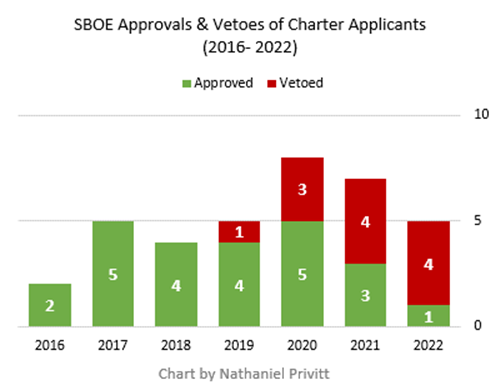Outgoing members of the Texas State Board of Education met this week with the full board, and took a parting shot at parents—just weeks before a new, more conservative SBOE is sworn in. Rejecting the voters’ clear wishes on expanding parent empowerment and ensuring that families can make the educational decisions that work best for them, the SBOE voted to further restrict charter schools and passed a resolution rejecting empowering parents with options in the upcoming legislative session.
Parent empowerment includes giving parents access to the learning environment that best serves their children. Parents should have the widest possible choices—be it traditional public schools, public charter schools, private schools, or homeschooling.
Public charter schools are very popular with Texas families: 375,000 Texas children attend these schools. Unfortunately, almost 60,000 more children are on waitlists because there are not enough charter school seats. A key reason there aren’t enough seats is that the State Board of Education (SBOE) has vetoed the applications of teachers and school leaders who want to open schools and serve Texas children.

The last four years have seen a surge in SBOE vetoes. From 2013 to 2018, the SBOE vetoed three applications. From 2019 to 2022, it quadrupled that number by vetoing twelve applications in four years. The SBOE’s number of vetoes have steadily increased each year, with one in 2019, three in 2020, and four in both 2021 and 2022.
Despite this, the SBOE took a unanimous and preliminary vote on Wednesday asking the legislature to increase its veto power so that SBOE can also veto the work of existing charter school leaders who want to open new schools and offer seats to waitlisted children.
Next, the SBOE voted 8 to 3 against empowering parents with options through Education Savings Accounts (ESAs). Four members didn’t vote. In March 2022, Texas Republicans voted on this Proposition: “Texas parents and guardians should have the right to select schools, whether public or private, for their children, and the funding should follow the student.” Statewide, results were overwhelmingly supportive: 88% of voters (1.6 million) support education freedom. While some paint rural communities as opposed to education freedom, voters in those areas do not buy it: The average support in Texas’ 200 most rural counties is still 88%. Rural voters support their neighborhood schools and are also conservatives who believe that parents should be empowered.
The members took these votes despite the fact that six of the 15 are leaving the SBOE at the end of this year. In their final days, the departing board members want to lock-in the priorities for the new SBOE. This stands in contrast to Gov. Greg Abbott, who declared in August that parents need and deserve choices in where and how to educate their children. We look forward to a new SBOE in 2023—one that is dedicated to empowering parents with the great schools that their children want, need, and deserve.